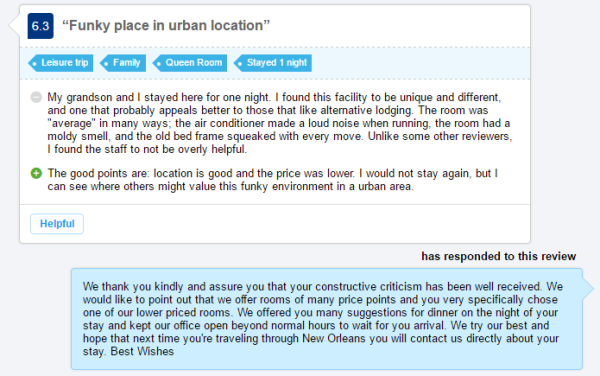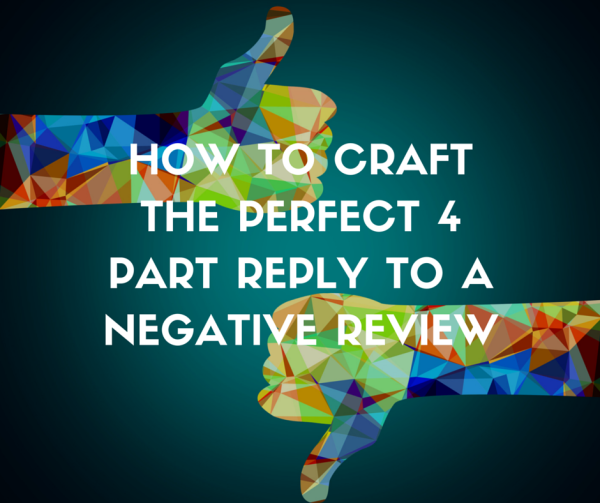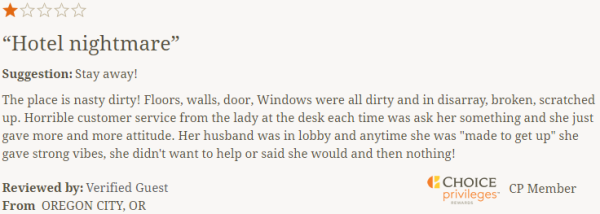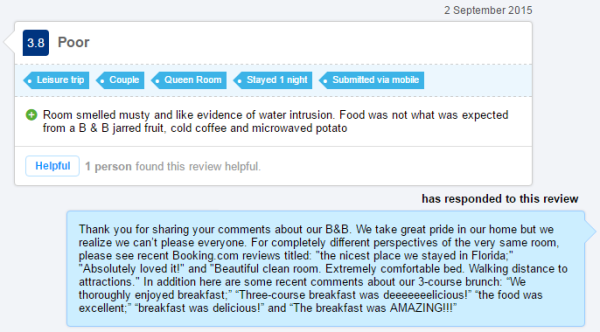First of all take a step back and breath. Just remember: don’t take it personal, if you do you will start writing a reply with a clouded judgement and that will just make things worse. The best thing you can do in a situation like this is to start drafting a calm and collected answer that addresses each complaint point. The worst thing you can do is ignore it and just let it sit there unanswered.
As a side note: If you are not using credit card purchases of rooms make sure to mark those who don’t show accordingly in your Booking.com dashboard. Or else the site will automatically send out a review form and charge you even if they were a “no show”. Although in most cases, it can be harmless, in some cases people do this on purpose to try and slander your establishment.
After reading the guidelines and best practices from several sites that have the review feature, I summarized them into a 4 part reply format to negative reviews:
Part 1. Acknowledge the reviewer: here you could thank him for taking the time to bring the complaint to your attention. Because even though it can look bad at first glance, genuine negative remarks can actually help improve your services and make sure it doesn’t happen for other guests that stay in your small hotel or b&b.
Part 2. If you dropped the ball… then you have to own it. If it was something you know for sure happened you shouldn’t lie or find excuses for it. We are all human, we all make mistakes.
Finding the courage to own up to one’s mistakes can turn a bad situation around. That being said this doesn’t mean you can just say you are sorry and not do anything about it. If people see that others have already complained about the same thing AND they see how much you “repented” but actually didn’t do anything about it you will be severely discredited. Once people see something negative in a review they will look for it and they won’t hesitate to post it again.
Case in point, while I worked for a B&B we had someone comment about the fact that the pictures on Booking.com were fake. Before this comment we never saw reviews of the sort. Guess what… after that we started having more and more of them. So the better you address them when they appear the less likely they will show up in the future.
Part 3. Explain your side of the story (if you were not in the wrong). Objective criticism is best countered with factual and objective evidence. So if they say that you wouldn’t give them their money back for a cancellation just point out your cancellation policy.
It does get more difficult when it comes to subjective criticism because it is hard to give a person that feels a certain way your answer or your opinion. The best thing to do is respect their personal preferences and remember that probably those who read those reviews don’t feel the same way.
What you could do in this case is point them to other reviews that prove the contrary. Although I don’t believe this should be your go to strategy, if all else fails you might want to consider it. But don’t rely solely on this to make your point come across.
Part 4. Offer to follow up by phone or email to set things right. If you feel that things weren’t clarified sufficiently try reaching out to them.
Most people think of these reviews as simply a way to promote yourself and put out a certain image about your business out there. But in fact it should be viewed as a great feedback tool that helps you improve your services and make sure that you offer your guests the best experience you can.
Don’t let your clients negative experiences end up as negative reviews. Try and be proactive and ask them all the time if everything is in order and if they complain about something try resolving it then and not in apologetic review replies.
During the research I’ve done for this article I have seen so many replies saying things like: “if only you would have told us … “ or “we didn’t know that …”. The bottom line is that it is your job to know if your guests are unsatisfied with your services.
Now let’s take a look at some examples and see how they were handled and if you think that applying the 4 part reply format would have made things better:
1st example: Oh dear!
Ok now objectively this looks pretty bad. I don’t know if anyone could spin this in their favor. But hey at least they tried right?… wrong, here is what they wrote:
“Posted by: PropertyManager
January 14, 2016
Thank you for taking the time to complete our online survey regarding your recent stay at our hotel.
On behalf of our entire team ,I would like to apologize for failing to exceed your expectations.Your satisfaction is important to us and we will be using the feedback you provided to make improvements to ensure we offer an exceptional experience for our guest in future.
I hope that you will consider staying with us again so that we can have another chance to provide you with a superior experience.
Sincerely”
And this is the exact reply they gave everyone in their negative review list (and trust me, it wasn’t short). From some of the other negative reviews I read it’s pretty clear that the place needs major renovations so I really don’t know what they could have promised because they most certainly would have been lies… but at least don’t add insult to injury by posting a cookie cutter reply.
Just don’t post anything and try to focus on the core aspects of your business like clean beds and a courteous staff. So there is no point in trying to post a 4 part reply since it’s clear that whatever you say in it is not going to make things better.
2nd example: No… you!

So the client pointed out three things that were wrong with the room and the owner might say OK this is good I know the things that need attention. But instead he does the opposite and shifts the blame to the customer telling him that it was his fault that he chose the cheaper room.
The difference in room prices should come from the size of the room or of the bead or on the number of amenities it has, but never on the quality of the room.
Funny thing is that in the first sentence he does the right thing and says that the clients criticism is “well received” but afterwards he just ignores most of said criticism. So that’s part 1 down and by shifting blame out goes part 2 and 3 of the reply model. In this case a different more emphatic answer would have been way better than basically saying “the customer is never right”.
3rd example: The word on the street is…
We see a bit of the same as the last reply in the sense that it’s the client’s fault for having too high of a standard. The difference here is that the owner tries to counter the criticism with some very subjective reviews he got from others. The problem here is that the complaints are very specific and the arguments being forwarded are not.
For example: “the nicest place…” or that “The breakfast was AMAZING!!!”. Usually when you see such a big difference between the best comments and the worst ones you might think that the truth is somewhere in between or even worse that one of the two extremes is made up. What is even worse is that the lack of quality of the food is mentioned in several other reviews it’s not just one guy saying it.
In this case even if they used the 4 part reply some people would still not be convinced. What they could do is start preparing meals right in front of people to prove that all the produce is fresh and amazing. They could mention that in the reply.
Hopefully after seeing these “how not to” examples and the 4 parts model you will be able to craft the perfect reply to those unfortunate negative reviews your small hotel or b&b gets.
Lorin is Inbound Marketer at HoteloPro, online hotel management system trusted by small hotels and B&Bs from over 15 countries.




